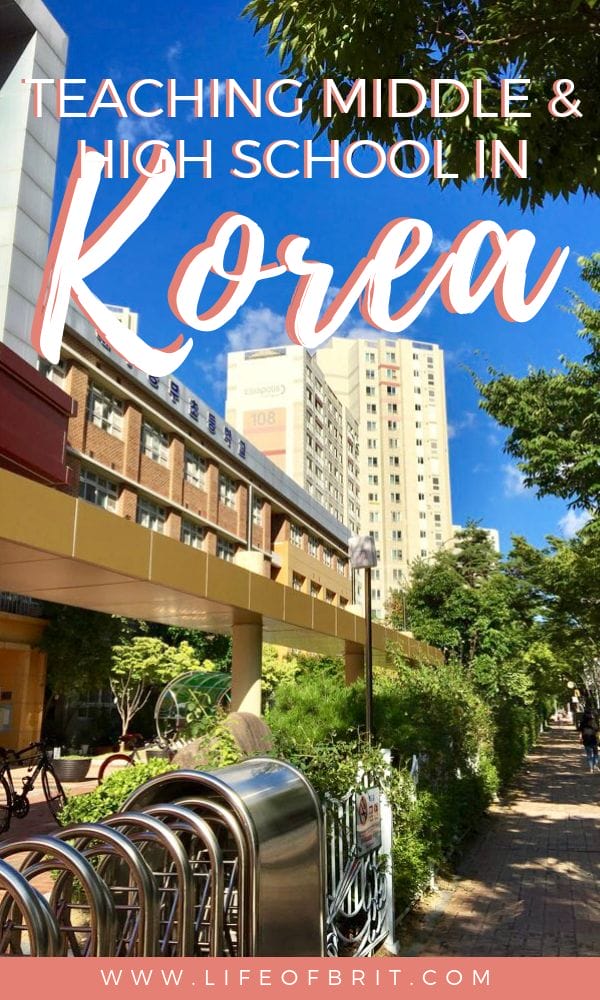Guest Post By Julia Brunner
So you’ve thought about teaching English with EPIK in South Korea, or maybe you’ve already applied! Many prospective English teachers picture getting to teach and play with little munchkin elementary-schoolers all day long, without having full responsibility in the classroom. Sounds like a dream, right?
If you’ve spoken with EPIK directly or have done any research into the program, this is what many people think. When I applied to EPIK and went through the EPIK orientation after I arrived, it was emphasized that most teachers will be placed in elementary schools. I’m not here to shatter your dreams, but don’t be surprised if you’re actually placed in a middle school or even a high school (which is quite rare).
Yes, that’s right. You may have to face pre-teens or even…. teenagers. Don’t you worry, though! I’m here to give you the low-down on what it’s like teaching in both a Korean middle school and high school. (***Disclaimer: Keep in mind that every school is different. This will not be your exact experience.)
Your Guide to Teaching Middle and High School in Korea
Teaching Middle School in Korea
First of all, I just want to say that you should absolutely be wary of the rumors that you hear about teaching middle school. They are not monsters!!! In fact, quite the opposite. Middle-schoolers are the most entertaining species on Earth, so just give them a chance. If I had to give one piece of advice, it would be to not take anything too personally. When in doubt, kill them with kindness and be patient. Encouragement and empathy goes a long way. Without further ado, here are some tidbits of knowledge that I can pass on to you:
General Bits:
- Most likely, you will work from 8:30am-4:30pm. Classes are 45 minutes long.
- There are loads of lessons to use at your disposal on Waygook and KorShare.
- The students have ~a little bit~ better English than elementary school.
- You’ll most likely have to give speaking tests once a semester. These are one-on-one sessions where you’ll ask the students a few questions and grade them based on their responses.
- Chances are you’ll be responsible for creating test questions for the students, including the speaking test questions.
- There isn’t a whole lot of admin work on your part. You’ll most likely have time to plan lessons at school without having to take any work home with you.
- Your classes may be split into higher level and lower level based on their English ability.
In the Classroom:
- They’re not as high energy as elementary schoolers, so if you’re more laid back this is a great gig.
- Since the students’ English level is a bit better, your co-teachers may use this as an excuse to not be in the classroom. This can cause a major headache for both you and the kids as some translation is definitely still needed.
- Behavior is more of a problem in middle school than at other ages. Your co-teacher ~should~ handle it, but be prepared to have to take matters into your own hands.
- Humor is DEFINITELY to your advantage. You don’t have to act as the classroom jester, but the occasional joke works wonders for their attention span.
Teaching High School in Korea
This is where sh** gets serious. If your high school experience was anything like mine (in the US), your main concern was what you were going to wear to prom or how you could possibly fit in a nap between Spanish club and sports practice. Korean high schools are a completely different story.
Once a student enters high school in Korea, they eat, sleep, and breathe studying. These three years of their lives are spent preparing for 수능 (Suneung), which is comparable to the SAT. This test pretty much dictates their future and which college/university they can attend after high school, and they take the test their last year of high school. It’s only offered once a year, and it’s a pretty big deal. If a student doesn’t pass the test, they can take it again the following year and may even be sent to a special boarding academy to focus all of their energy preparing for the chance to take the test again the next year.
This test is such a big deal in Korea that on the day of the test, airplanes aren’t allowed to fly anywhere in the country during the English listening portion of the test. Parents and families flock to sacred temples to pray for good results for their students. And all of the schools, elementary and middle included, begin their day two hours later to minimize traffic on the streets and therefore minimize noise and possible distractions while the test is ongoing. So, if you get placed in a Korean high school with EPIK, keep this in mind. You can just feel the tension in the atmosphere.
Now, there are two different kinds of high schools. There are technical high schools, where most students do not plan on attending college, and regular high schools, where most students plan on attending a university. My experience is with a regular high school, so that is what I will focus on. Here is what you can expect from teaching at a Korean high school:
General Bits:
- Your working hours will be longer, but they’re nothing in comparison to how long the students stay at school. My working hours were from 8am-4:30pm, but I taught after school conversation classes once a week for 1-2 hours. Classes are 50 minutes long. Students have to be in their homeroom classes by 7:50am with regular classes finishing at 4:20pm. The vast majority of students then stay and take after school classes, eat dinner in the cafeteria, and then study some more. It’s very common for students not to leave school until 10 or 11pm.
- There are student dormitories located on campus for students who find it too hard to commute due to the long school hours.
- High schools are for the most part single-gender. I taught at an all-girls school (which I loved) but I have also taught camp at an all-boys school (and they were so respectful and absolutely hysterical).
- Truthfully, you will have a lot more work. There are not many lessons for high school available to use online, so I created all of my own content. Also, you may have to grade the students’ essays from time to time.
- The high school students’ English level is much higher than younger grades. You can actually have full conversations with most of the students.
In the Classroom:
- The English level of the students is so high that I really didn’t need assistance from my co-teachers. The students could understand almost everything I said, and if they couldn’t, other students helped translate.
- Bad behavior is not even an issue, aside from some chattiness. Students are overall pretty respectful.
- Be prepared for students to sleep in your class. They are eternally exhausted from their insane school schedules. Many students bring a pillow and blanket to class so that they can sleep when their work is finished.
- High school students study much more complex grammar and vocabulary than younger students. Even though you will probably not teach grammar, brush up a little bit so that you can answer their questions in class and not look like a fool.
If you would like to know more about the Korean school system I highly recommend watching the BBC documentary School Swap: Korea Style. It provides such good insight into what the students go through in school.
As a bonus tip, when you apply to teach English in Korea through EPIK, you really don’t get much say in which level school you’re assigned to. Majority of applicants are sent to elementary schools, but that’s not always the case. They don’t outright tell you this, but in your EPIK application, the mock lesson you choose to provide is actually used as a determining factor for your placement. So if you want to teach middle or high school in Korea, create a lesson plan for this level and you’ll increase your chances of getting that placement.
Also, if you have any prior teaching or TEFL experience and it was specifically in a middle or high school, they also use this as an opportunity to place you in a middle or high school. They look at this experience as an indicator that you’ll be better equipped to handle the slightly more demanding nature of the job in a middle/high school.
This was my own personal experience teaching at a middle and high school in Korea, but each and every EPIK teacher has a different experience. These tips can give you a glimpse as to what’s to come, but you really won’t know about your exact situation until you pack up and move your entire life across the world. How thrilling!!
Any questions or comments about teaching in middle and high schools in Korea? Share below!
Author
Julia is a native Floridian and (newly) former English teacher with the EPIK program in Korea. Her favorite pastimes include taking Buzzfeed quizzes, enjoying a nice IPA, and talking about TV shows.


